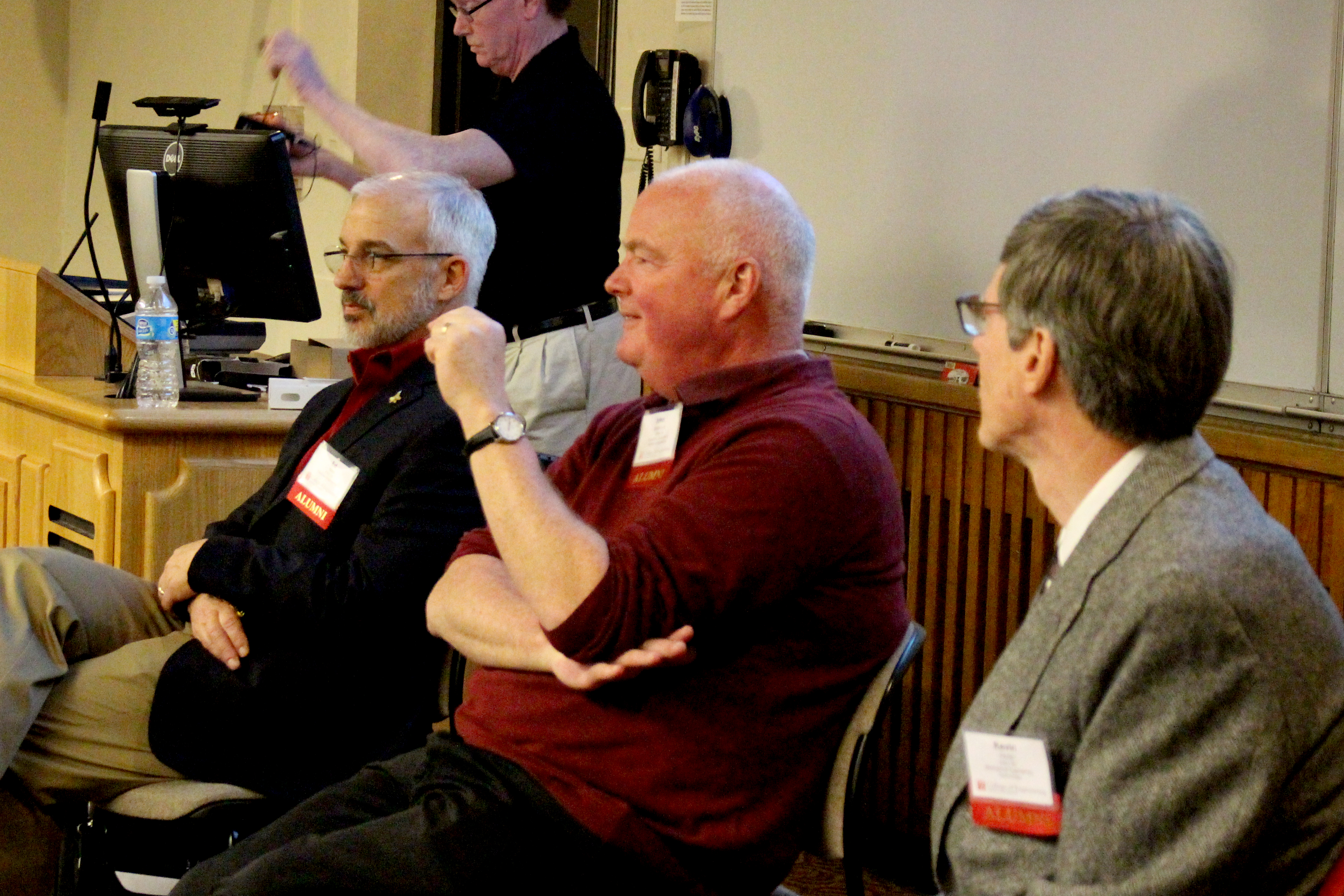Three Engineering alumni share their experiences during Engineers Week

The road to success is rarely direct and easy. Life creates detours and goals can require to circuitous routes to be reached. In the field of engineering, change is one of the few constants. During Engineers Week in late February three Temple alumni returned to North Broad to share their experiences and perhaps help the next generation of Temple innovators.
Lockheed Martin Senior Project Manager Kevin Horan (ENG '89), Project Manager Edward Neel (ENG '88), and Senior Technical Fellow John Stetson, Jr (ENG '99) for a panel discussion titled "Lessons Learned at Lockheed Martin."
Before the event, the College of Engineering wanted some career insights from Horan and Neel, who were joined by Robert Gelsher (ENG '88), former engineer at Boeing that is now a financial advisor at Janney Montgomery Scott. While the three didn't know each other, it was soon established that they all had commonality in their journeys. All three spent at least a portion of their careers at Temple as non-traditional or part-time students. Horan got his first undergraduate degree in business management from St. Francis University in 1975, going part-time at night for most of the 80s. Neel spent six years in the Navy before finishing his degree. Gelsher, who was a Navy contractor, also went part-time at Temple. "It's an engineering decision," Neel recalled of his path. "You come to your analysis and it says 'This is where I need to go, this is what I had to do.'"

A common bond these men share is their commitment to lifelong learning, an ideal they imparted to the students. All three have continued taking courses, either for degrees or certificates, over the years, and through their employers. This is a key element to success with longevity in this or any other field. Lockheed Martin has adapted to needs that change over time, and so should employees in their roles. "I've gone through redesign, reorganization, right-sizing, down-sizing, defense spending changes, it's come back around," said Neel. "You got to innovate yourself. On the production line at Lockheed there's innovation on the way we build our processes in building our machines and building our aircraft that gets us down an affordability curve. You have to do that on yourself and innovate on yourself to stay marketable and affordable."
The biggest change over time is the technology. "The labs have changed so dramatically," noted Horan, comparing the College's current facility to when he attended. "When I first started in the business, there were no computers on people's desks. We used typewriters. Over time, where I am, we went from doing a lot of mechanical assembly, special purpose machine design, it's all software-based now." Horan switched his focus in the 90s when the company offered new training for systems engineering. "All those special purpose machines we designed, that's gone away. It's all software now."
Making the transitions isn't easy or safe. It helps to have people you trust. Gelsher discussed how his Navy mentor helped him advance his career and take on a special project no one seemed to want. "I didn't know him at first but I was curious because he was very good at developing projects. He was very innovative with the Navy. I found out where he was working and applied to work for him. He became my supervisor. I kept volunteering for projects to work with him and became his right-hand person. I was always volunteering myself, putting myself out there."
It paid off for him. "One of my first projects was designing a pressure vessel that a lot of the engineers were afraid of, they didn't want to get involved so it just sat there. They thought about giving it to a contractor but the cost was too high." Gelsher volunteered and completed the project at a third of the projected costs from the contract bid. "My mentor always had my back for me when issues arose."
Horan has served as a mentor and protégé and knows how fulfilling the experience is. "It's most gratifying as a mentor because someone is coming to you and saying, 'I think your advice is valuable.' I was certainly helped along the way. I probably wouldn't have come back to Temple if I hadn't gotten a push. The people that help don't tell you what to do but help you look into yourself, know what your motivations are, what your strengths and what your weaknesses are. They do it in a non-judgmental way. What do I want to do when I grow up? You have to keep asking yourself that question, even when you get older. Some people know, intuitively, from the time they're little. Others are late bloomers, like myself, until one day it clicks."
Mentoring is helpful but networking is also key, the group agreed. Beyond your professional circle, the alums encouraged students to find leadership positions in social groups in their area. The College of Engineering enjoys robust involvement in professional and social societies, on display during Engineers Week in late February. Neel cites his passion for cycling as a good way to meet people in his line of work. He shared information about leadership development opportunities at Lockheed with students, "You go around to different departments for six months to a year, you figure out where you fit in. Usually in that span of time, you get offered a job."
Even after attending the second-largest university in Pennsylvania, transitioning to a job at a massive, diverse company like Lockheed Martin can be daunting. Horan said not to be intimidated. Like Philadelphia, Lockheed is a company of smaller, neighborhood-like units. "It's not, you're part of a 100,000-group enterprise. You're part of a 30-group enterprise."

